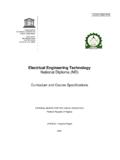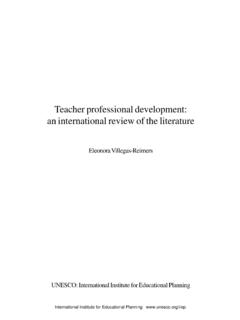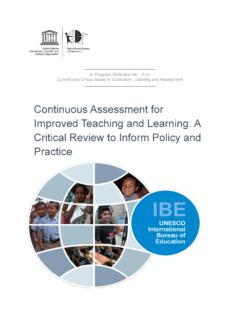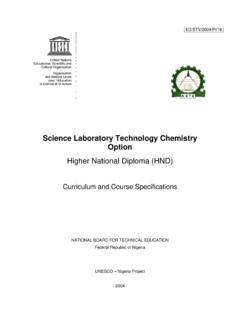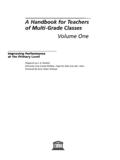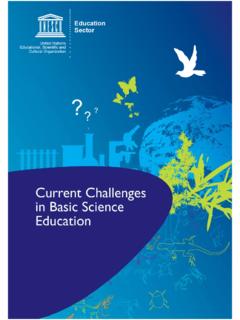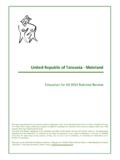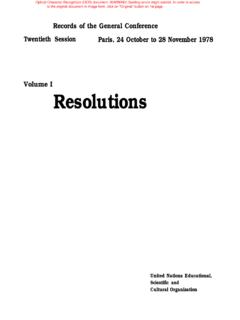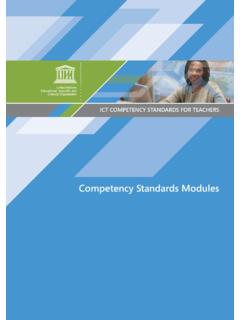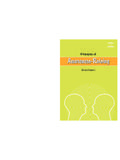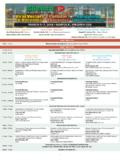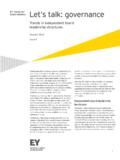Transcription of The UNITWIN/UNESCO Chairs Programmen
1 The UNITWIN/UNESCO Chairs Programmen Guidelines and proceduresn unesco unesco Paris 2017 2 3 Introduction The UNITWIN/UNESCO Chairs Programme (further referred to as the unitwin Programme ) was established in 1992, in accordance with a resolution adopted by the General Conference of unesco at its 26th session (1991). The Programme supports the establishment of unesco Chairs and unitwin Cooperation Programmes in higher education institutions. It promotes international inter-university cooperation and networking to enhance institutional capacities through knowledge sharing and collaborative work. Through the Programme, higher education and research institutions worldwide pool their resources to address pressing challenges and contribute to the development of their societies. This unesco Programme serves as a prime means for enhancing the capacities of higher education and research institutions through an integrated system of research, training, information and documentation activities related to diverse fields.
2 It facilitates collaboration between high-level, internationally recognized researchers and teaching staff at universities and other higher education and research institutions, in a spirit of international solidarity. The unitwin Programme promotes North-South, South-South and North-South-South cooperation as a strategy to develop institutions. These institutions work in partnership with NGOs, foundations and public and private sector organizations and play an important role in the advancement of higher education. The Programme opens avenues for the global higher education and research community to join forces with unesco to contribute to achieving the Sustainable Development Goals (SDGs). The unitwin Programme covers training, research and exchange of academics and offers a platform for knowledge sharing in all fields within the mandate of unesco . The majority of the projects are interdisciplinary and intersectoral, involving all unesco Programme Sectors, with the active cooperation of its Field Offices, Institutes and Centres.
3 National Commissions play an important role in the Programme by promoting it nationally, facilitating its implementation and evaluation. Since it is very multidisciplinary in nature, the unitwin Programme is one of the Organization s most intersectoral programmes. Relevance, foresight and effectiveness are among the prime goals of the Programme. Universities and higher education and research institutions can respond more readily and with greater autonomy to the demands for new learning and research in a world undergoing rapid economic, social and technological changes. From the beginning, unesco Chairs and unitwin Cooperation Programmes have proven useful in establishing new teaching programmes, generating new ideas through research and reflection, and facilitating enrichment of existing university programmes while respecting cultural diversity. The present document constitutes a set of basic rules to be followed in order to maximize the benefits of the Programme. These Guidelines and Procedures aim at clarifying and defining the criteria and procedures governing the establishment and functioning of a unesco chair or unitwin Cooperation Programme.
4 4 The strategic orientations for the unitwin Programme place an emphasis on the following: the dual function of unesco Chairs and unitwin Cooperation Programmes as think tanks and bridge-builders between the academic world, civil society, local communities, research and policy-making; align unesco Chairs and unitwin Cooperation Programmes with unesco s priorities as defined in its Medium-Term Strategy for 2014-2021 ( ); uphold the values of unesco and incorporate the 2030 Agenda for Sustainable Development into the operations of unesco Chairs and unitwin Cooperation Programmes; increase and enhance the focus on the 2030 Agenda of activities carried out by unesco Chairs and unitwin Cooperation Programmes, and to develop programmes aimed at generating new knowledge, as well as innovative tools for Member States to face the challenges faced in achieving the SDGs ( ); strengthen North-South, South-South and North-South-South cooperation; foster inter-disciplinarity and promote collaboration and knowledge co-production; strengthen the research-training-policy-society nexus; foster collaboration between Chairs and Networks, the broad unesco family and key unitwin Programme stakeholders; promote further the thematic networking of unesco Chairs , enhance knowledge sharing and increase the visibility of the unitwin Programme as a whole; create centres of excellence and innovation at the regional or sub-regional level; and, reinforce the dynamism of networks and partnerships.
5 This document supersedes earlier guidelines. It aims to assist all interested parties in taking the steps needed to participate fully in the unitwin Programme and to make the most of its benefits. Section of Higher Education Division for Policies and Lifelong Learning Systems Education Sector December 2017 5 Definitions unesco chair A unesco chair is a project and a team at a university or a higher education or research institution that partners with unesco in order to advance knowledge and practice in an area that is a priority for both the institution and unesco . The partnership is formalized by means of an agreement signed between the Director-General of unesco and the head of the institution hosting the unesco chair (Rector, President, Vice-Chancellor). A unesco chair can be established as a new teaching and research unit at a university or other institutions of higher education and/or research for a period of four years. Such a unit should include: a chair holder as its academic head; a team composed of lecturers and researchers from the host institution and from other institutions, both in the country concerned and in other countries who are associated with the activities of the unesco chair ; and, students and researchers from the host country and from other countries who are pursuing studies or high-level training and research under the unesco chair .
6 A unesco chair can also be established within an existing university department to strengthen teaching/research programmes in a particular field within the domains of competence of unesco , and to increase their international dimensions. Since unesco Chairs are undertakings in which unesco joins forces with partner institutions, associations, agencies and organizations as well as with potential donors, unesco Chairs may also have a joint designation, for example, unesco /United Nations University; unesco /Commonwealth of Learning. unesco Chairs and unitwin Cooperation Programmes are not usually named after individuals, except when they are intended to commemorate an outstanding and universally acknowledged contribution made to the field of study concerned by a person (for example, Cousteau Ecotechnie Network, Oliver Tambo chair in Human Rights). Acronyms are not used either. Names of Chairs and Networks must accurately represent their fields of research. unitwin Cooperation Programme A unitwin Cooperation Programme is a partnership between unesco and a network of universities, other higher education or research institutions (from 3 to 10 institutions) in different countries that join forces and collectively sign an agreement with unesco .
7 6 A group of universities in different countries (North-South, South-South or North-South-South) may decide to pool their competences and resources to address a need in the development context, and in so doing create a network and apply for the establishment of a four-year unitwin Cooperation Programme. The partnership is formal and is established through a standard agreement between unesco and the network. The agreement spells out the responsibilities of the Parties, the objectives of the Cooperation Programme and expected outputs, how the Cooperation Programme will function and how it will be sustained. Each Party within the network appoints its own Coordinator for the Cooperation Programme in consultation with the other Parties. Networks assume all expenses linked to the implementation of the unitwin Cooperation Programme. Universities and other higher education institutions hosting unesco Chairs working on the same theme may come together as a network and apply for a unitwin Cooperation Programme.
8 Once unesco approves the application, the unitwin Cooperation Programme is formalized by means of an agreement between unesco and the network. Universities that are already linked with other universities by virtue of bilateral agreements may decide to expand these bilateral agreements into a multilateral one and apply for a unitwin Cooperation Programme. University cooperation programmes (training and research) in a particular field may be turned into more stable mechanisms of cooperation by the participating institutions agreeing to associate their activities with the priorities of unesco , the needs of higher education institutions, and the goals and objectives of the unitwin Programme. Institutions that can host a unesco chair or a unitwin Cooperation Programme unesco Chairs or unitwin Cooperation Programmes may be established only at universities, institutions of higher education and research institutions in higher education that are recognized as bona fide institutions by the competent national authorities in the respective country.
9 However, other types of institutions can partner with a unesco chair or a network. These include: NGOs working in the field of higher education and research; other academic associations; inter-university and academic networks that wish to establish a link between their own activities and the unitwin Programme; and, national, regional and international public or private institutions and agencies that currently have or intend to develop cooperative links and arrangements with unesco in the field of inter-university cooperation. Proposals for a unesco chair or a unitwin Cooperation Programme should be submitted to unesco by institutions eligible to participate in the Programme. 7 Financing of unesco Chairs and unitwin Cooperation Programmes The overall success of unesco Chairs and unitwin Cooperation Programmes depends on the availability of financial and in-kind support. unesco , not being a funding agency, cannot provide financial support. For this reason, institutions applying for the Programme should mobilize financial partners when they start planning their project proposals.
10 This aspect must be fully documented in the proposal, as the project s sustainability is one of the key evaluation criteria. There is a wide range of possibilities for mobilizing resources: the host institutions: many universities have allocations for promoting international cooperation; bilateral donors, multilateral cooperation agencies and private sector organizations; non-governmental organizations and private foundations; unesco Participation Programme: a proposal for funding a unitwin project may be made to the National Commission for unesco in the country concerned. Establishment of a unesco chair or a unitwin Cooperation Programme Procedure for the submission of applications Interested institutions prepare and submit to the Assistant Director-General for Education of unesco under the signature of the executive head of the institution a detailed project proposal according to the project outline in the Annex. It is important to note that unesco Chairs and unitwin Cooperation Programmes are established between unesco and the institutions concerned and not with individuals.
